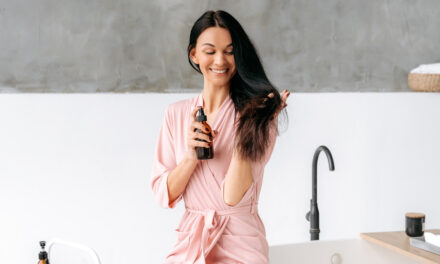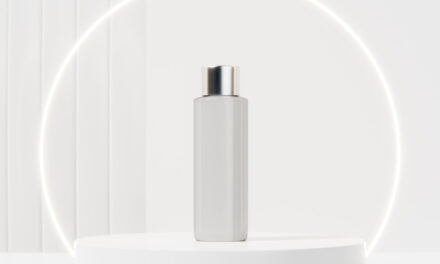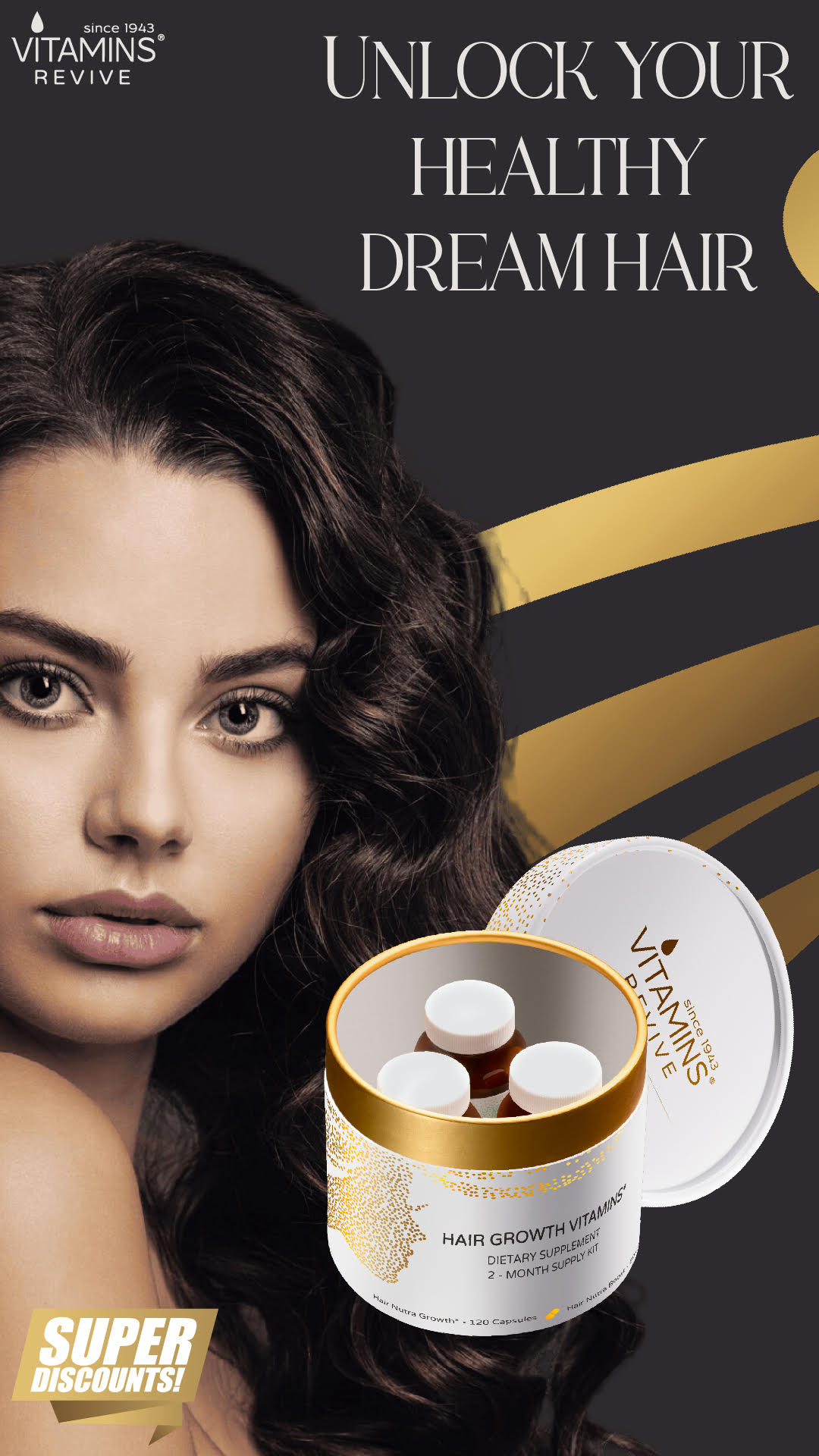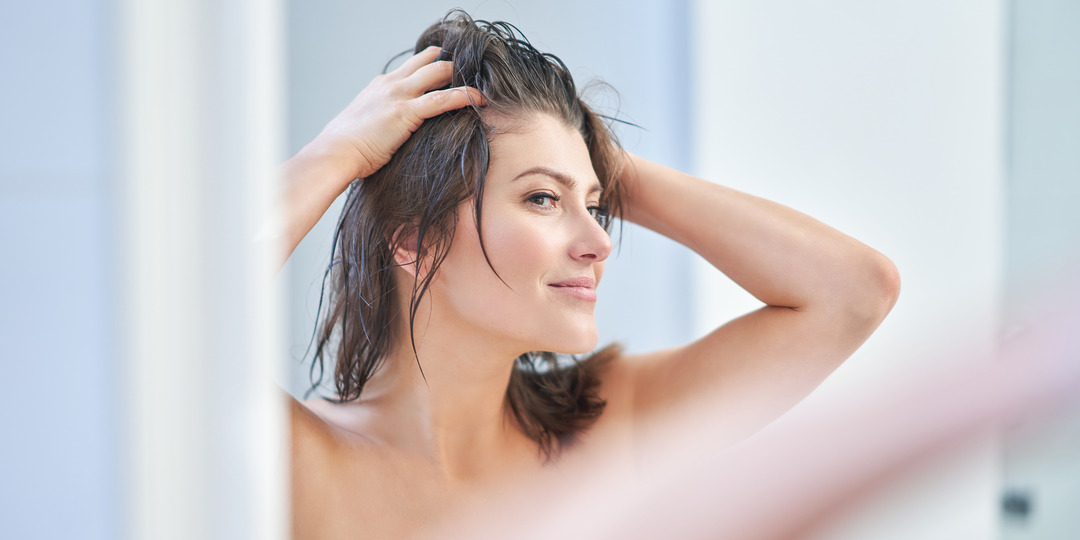
With more awareness about the adverse effects of chemicals, more people are now trying to prepare their hair care products. In the line of the recipes we’re adding, this time, it’s a DIY Leave-in Conditioner that’s natural and promotes hair growth.
Like every other recipe out there, it has similar ingredients as the base. But we have one special ingredient that makes this a good leave-in hair treatment to promote hair growth. What is it? Horsetail extract – we’ll learn more about our ingredients after the recipe. Let’s go to the recipe, shall we?
Ingredients
- Shea Butter – 4 Tbsps.
- Coconut Oil – 3 Tbsps.
- Argan Oil – 1 Tbsp.
- Witch Hazel – 2 Tbsps.
- Horsetail Extract oil – 16 Drops
- Rosemary Essential Oil – 7 Drops
- Vitamin E Oil – 1 Tbsp.
Instructions
- Melt Shea butter and coconut oil in your double boiler.
- Don’t have a double boiler? No worries, do a make-shift one by placing a larger pan half-filled with water on the stove and placing a smaller vessel in the water. Now, add the Shea butter and coconut oil in the smaller vessel and let it melt.
- When melted, remove from heat.
- Add argan oil, witch hazel, horsetail extract oil, rosemary Essential Oil and Vitamin E Oil.
- Stir to combine and transfer to a dark amber glass jar or a spray bottle.
- Let it sit for two days to set and for the essential oil to release its aroma well.
- Done!
How to Use the Leave-in Conditioner?
After hair wash, air dry your hair. When dry, apply this leave-in hair conditioner to your hair – don’t forget the tips.
This fairly light leave-in treatment can be used on your scalp.
As we always say, little is more, so ensure you cover all your hair, but don’t go overboard with the quantity.
Repeat between washes if you feel your hair is dry.
Who Can Use This Conditioner?
This can be used by anyone and suits all hair types, such as curly hair or even frizzy hair. Since we use Shea butter, it’s not that dense so it won’t weigh down thin or fine hair.
Anyone who wants to promote hair growth rate, curb hair thinning or hair fall, and want to grow out their hair can use this deep conditioner.
Shelf Life
You can prepare smaller batches whenever you have time to keep it fresh and swap your recipe ingredients to try out different aromas or ingredient combinations.
However, for those who want to prepare a larger batch, we highly recommend preparing one every six months or so – to keep the efficacy and freshness of the recipe.
The shelf life is as long as the ingredients you put in – so check the ingredient labels and see what time is left for your oils and butter and go with it.
Tips to Tweak the Recipe
You can also add Murmuru butter to this recipe. Rich in lauric acid, it is a very good moisturizer, and the rich fatty acid content retains moisture longer.
This penetrates your shaft and moisturizes it from within. If your hair tends to lose moisture often, if you have thick hair, this is a very good addition you can consider.
For those who don’t prefer coconut oil, you can substitute it with olive Oil, sweet almond oil, Jojoba oil, apricot oil, or other carrier oils of your choice.
Rosemary essential oil promotes hair growth, but you can swap it for other hair-beneficial essential oils like lavender essential oil, peppermint essential oil, ylang-ylang essential oil, cedarwood essential oil, clary sage essential oil, tea tree oil or lemongrass oil. All these essential oils promote hair growth and offer other hair-related benefits.
Choose the one that suits your scalp and hair type best. Shea butter and rosemary, along with other ingredients, give this own leave-in conditioner a mild and pleasant fragrance.
However, if you prefer to add essential oils, you can add your preferred aroma. You can also whisk this conditioner to a more lighter and easy-to-apply consistency – not that the conditioner is thick but whipping incorporates more air and gives it a nice texture.
Why These Ingredients?
Shea Butter
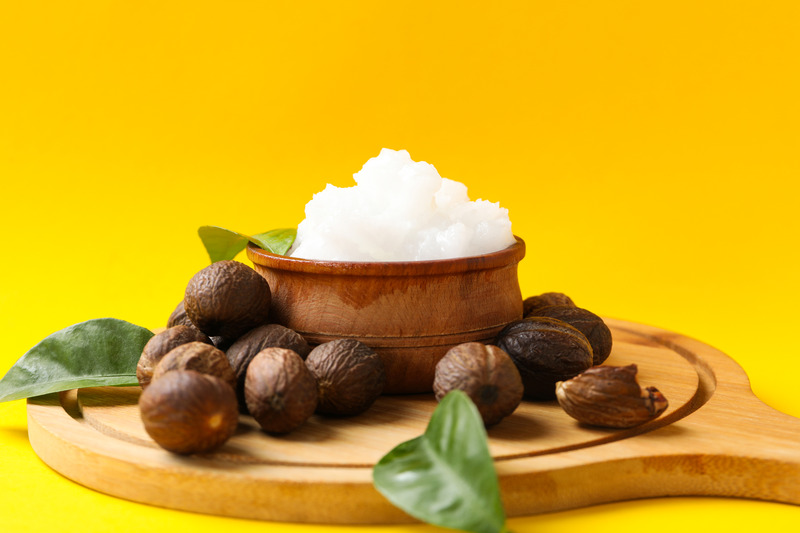
Shea butter is a staple in many natural skin and hair care products. It is a very good hydrator, moisturizer, and nightly nutrient-rich.
Irrespective of the nutrient-rich profile of this butter, it’s extremely light and makes it suitable for everyone, including those with oily scalps. It soothes and softens hair, which is ideal if dry, frizzy, or untamable hair.
It revitalizes and repairs hair, bringing dull and damaged hair back to life and health. It prevents scalp damage and protects hair from environmental damage.
It doesn’t clog your pores and nourishes your hair shelf from within, promoting better hair growth and healthier hair. It also reduces inflammation and irritation, so if you have an itchy or irritated scalp, Shea butter will soothe your scalp.
It is rich in Vitamins E, and A, minerals zinc, iron, magnesium, sodium, calcium, and triterpenes. The triterpenes will boost collagen production, strengthening your hair shaft and preventing hair thinning. It also fights dandruff, which is a bonus!
Coconut Oil

Coconut oil is a staple in hair and skin care in many countries and is affordable. It is also widely available and offers numerous benefits.
In many ways, it’s unbeatable and takes the cake when it comes to hair and skincare. It’s a versatile and multi-purpose oil – use it as your go-to oil for hair, as a makeup remover, for minor cuts and scratches, as a moisturizer, or even for cooking!
Mostly composed of medium chain fatty acid called lauric acid, it’s readily absorbed into the hair shaft. When used regularly, it prevents protein loss, a key reason for thinning hair.
For this purpose is used as a pre-shower treatment in Asian countries. It moisturizes and protects hair from environmental damage.
Rich in nutrients, it boosts hair growth rate and prevents hair fall. Coconut oil is antimicrobial and antiprotozoal and can prevent yeast and other microbial infestations.
It has antiviral, antifungal, and antibacterial properties and effectively combats scalp infections and issues, including dandruff.
Argan Oil
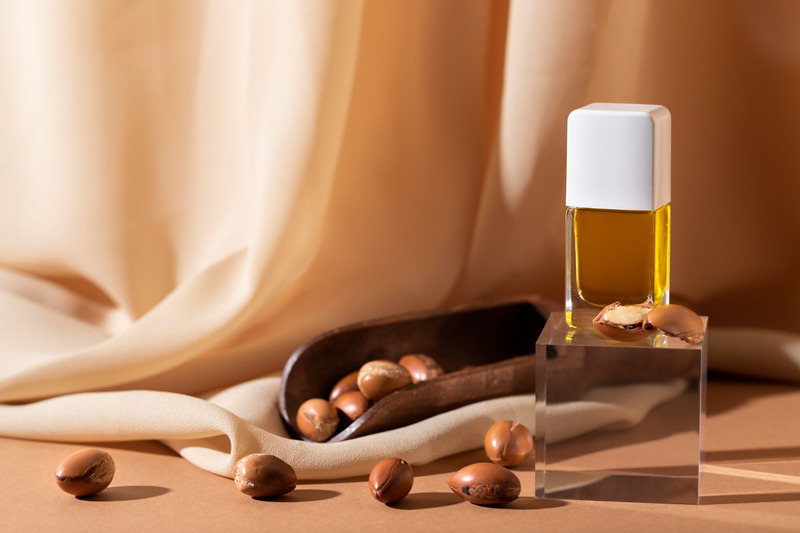
Argan oil is extracted from the fruit kernels of the argan tree and is popularly called the liquid gold of Morocco due to its numerous benefits. It is widely used by Moroccan women for hair and skin care and is also used as cooking oil in Morocco.
Rich in oleic and linoleic fatty acids, Argan oil is a great moisturizer. Rich in anti-inflammatory properties and antioxidants it is used to combat scalp issues like hair loss, dandruff, psoriasis, etc.
It combats hair damage caused due to excessive heat and styling-induced damage. It nourishes, nurtures, and protects hair and improves hair growth, combats hair damage, dryness, and frizz, and makes hair manageable.
Witch Hazel

We all know witch hazel is widely used in skincare but do you know it offers many benefits for hair care, too? Yes, it combats excessive oil levels in your scalp, fights dandruff and other scalp issues, including flakiness, promotes hair growth, reduces inflammation, and cleans the scalp.
We all know scalp oil levels are important since excessive oil can also cause issues, including limp hair, and can trigger hair loss. Witch hazel regulates the scalp’s sebum levels effectively.
A good anti-inflammatory, it also reduces inflammation-related issues and soothes your hair. Dandruff could also be due to inflammation, which can, in turn, trigger flakiness. Both can be curbed with witch hazel. It’s a gentle cleanser and refresher.
Horsetail Extract Oil

Horsetail has been used for centuries due to its remedial properties. Did you know it’s great for hair care? Horsetail is also used internally as a supplement to promote better hair and skin.
Rich in silicon and antioxidants, horsetail can boost hair growth. Silicon promotes hair growth, being the key mineral for hair and skin. Antioxidants reduce inflammation and protect hair.
Horsetail is said to impact collagen production, which is also used to improve bone and joint health. It also improves hair health and gives shiner and healthier hair.
It is also believed to curb hair thinning and strengthen hair. It is rich in numerous nutrients, including but not limited to Vitamins B1, B2, B3, B5, B6, Vitamin C, Vitamin E, Vitamin K, Folate, Sodium, Calcium, Magnesium, Zinc, Copper, Iron, Silica, etc.
Rosemary Essential Oil

Rosemary essential oil improves hair growth, prevents premature graying, and fights dandruff. It also helps combat scalp itchiness and dryness, moisturizes hair and scalp, and boosts scalp circulation.
Vitamin E Oil

Leave-in conditioners, either for thick or thin hair, are nourishing oil for the scalp and also improve the shelf life of oil or butter-based DIY products. Not only as a preservative but also to promote hair growth and improve hair health, Vitamin E oil is a great addition to this recipe.
Don’t have time for DIY recipes? No worries, we have you covered with a range of products from Vitamins Revive. Check out their products online at Vitamins Revive Store to know what options they have for you.
Feel free to write back to us with any questions or queries. The fun of DIY is the tweaking and trying out different variations, so make tweaks that you’re curious about and keep us posted with your results.
DIY Naural Leave in Conditioners FAQs
Here are the frequently asked questions for DIY natural leave-in conditioners.
What Does Leave-in Conditioner Do for Natural Hair?
Leaving in conditioner does a few things for natural hair. It helps to detangle the hair, keep it hydrated, and add shine. It can also help protect the hair from environmental pollutants and reduce frizz.
How Long Does the Leave-in Conditioner Last?
It can last up to 3 days, but it really depends on your hair type.
Can You Use Aloe Vera as a Homemade Leave-in Conditioner?
Aloe vera juice and aloe vera gel can be used as diy natural leave-in conditioner.
Aloe vera juice is great for repairing and conditioning hair. It helps to seal in moisture, add shine, and reduce frizz. Aloe vera gel is also great for conditioning hair. It helps to detangle hair, add shine, and reduce frizz.
Can You Use a Leave-in Conditioner Every Day?
Leave-in conditioners are extra hydrating for your hair. If you need hydration, use one every day. Damage may occur if your hair type does not require the extra moisture but only uses it occasionally. Always read labels before purchasing any product.



